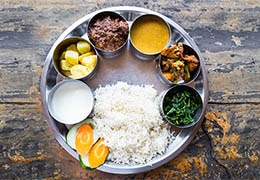A calorie deficit can be created by consuming fewer calories per day or week than is required to maintain one's current weight. This calorie reduction may result in weight loss over time.
Introduction
To lose weight, it’s important that you consume fewer calories than you burn. This phenomenon is known as a calorie deficit. You can increase your calorie deficit value by adjusting what you eat and how much you consume. That’s where a calorie deficit diet comes in. For healthy weight loss, most doctors and nutritionists recommend a perfect blend of calorie deficit foods and exercise.
If you’re also trying to get back in shape, let’s find out how to make a perfect calorie deficit diet plan and what calorie deficit foods to include in it. We will also further discuss the benefits of a calorie deficit diet plan and its importance in developing a healthy lifestyle.
How to Maintain a Calorie Deficit Diet
According to research, eating calorie deficit meals consistently results in weight loss, lower cholesterol, and less inflammation. While the concept may appear simple, a calorie deficit diet can be difficult to maintain without professional guidance. Hence, we spoke with top nutrition and health experts to find out the best ways to maintain a calorie deficit diet. Here are their suggestions. Please note that for personalised nutrition requirements and health goals, professional guidance is advised.
Eat Plenty of Protein
It is critical to consume the necessary quantity of protein every day, which is 0.8 grams per kilogram body weight. Protein keeps you full for longer because it metabolises slowly, which can help limit your appetite significantly. Soy products, chicken, eggs, fish, nuts, legumes, seeds, and quinoa are some examples of protein-rich foods.
Consume More Liquids
Studies show that drinking water prior to meals may help you eat less calories. Drinking plenty of liquids throughout the day will help you feel satiated. Thus, include items like infused water, smoothies, soups, and juices in your calorie deficit diet.
Consume Fibre rich food
Eating foods high in fibre is a simple way to keep your calorie intake under control. Fibre rich foods are typically low in calories and contain a variety of nutrients that reduce appetite. In fact, soluble fibre slows gastric emptying and promotes satiety, whereas insoluble fibre smoothes the movement of food through the intestines.
Calorie Deficit Foods
Apples
Research says, “an apple a day keeps obesity away.” Yes, you heard it right. Apples are high in fibre and provide just the right amount of sweetness to sate your cravings. For these reasons, apples are also considered one of the essential elements of the best calorie deficit diets.
Whole grains
Eating healthy whole grains such as oatmeal, brown rice, and whole-grain bread or pasta will keep you full for long hours. This is because whole grains include an abundance of fibre and take longer for your body to digest. A 2019 study found that there’s a direct link between eating whole grains and having low body fat.
Crunchy Veggies
Crunchy vegetables are ideal ingredients for a great calorie deficit Indian diet. Green veggies are nutrient-dense, low in calories, and strongly linked to maintaining a healthy weight.
Add crunchy and crisp vegetables like broccoli, celery, carrots, cucumbers, or bell peppers to your calorie deficit diet to feel truly satiated.
Nuts
Due to their high nutrient content, nuts aren't generally seen as a low-calorie snack.
For example, 10 to 12 almonds in one serving provide roughly 100 calories. However, consuming those 100 calories will help you stay full for a long time and lower your chances of munching later in the day. Thus, a moderate consumption of nuts like almonds and walnuts can help you maintain a calorie deficit diet.
Calorie Deficit Diet Plan
Please note that there is no one diet plan that can work for everyone. We all have different nutritional needs depending on our weight, height, and gender. Hence, it is better to consult a nutritionist or a doctor before altering your diet.
The following diet plan is for reference only. However, it will still help you visualise what a professionally prepared 7 day calorie deficit diet plan should look like. For ease of reference, we have limited the calorie intake to 1500 kcal:
Breakfast (397 calories)
- 2 servings Apple Cinnamon Oats
- 1 Orange
Morning Snack (190 calories)
- 1 medium apple, sliced
- Tbsp. peanut butter
Lunch (307 calories)
- 1 serving Cabbage And Paneer Grilled Sandwich
Evening Snack (105 calories)
- 1 medium banana
Dinner (507 calories)
- 2-3 serving Chicken Fajita Taco
Daily Totals: 1,526 calories, 46 g protein, 243 g carbohydrate, 38 g fibre, 45 g fat
Conclusion
For some people, sticking to a weight loss strategy can be challenging. Despite the fact that motivation might momentarily influence healthy lifestyle choices, long-term objectives demand enduring modifications to behaviour.
People may therefore need to undertake long-term lifestyle adjustments in order to reduce weight safely and effectively while maintaining a healthy weight. Before altering their diet, people should consult with their doctor or dietician.












